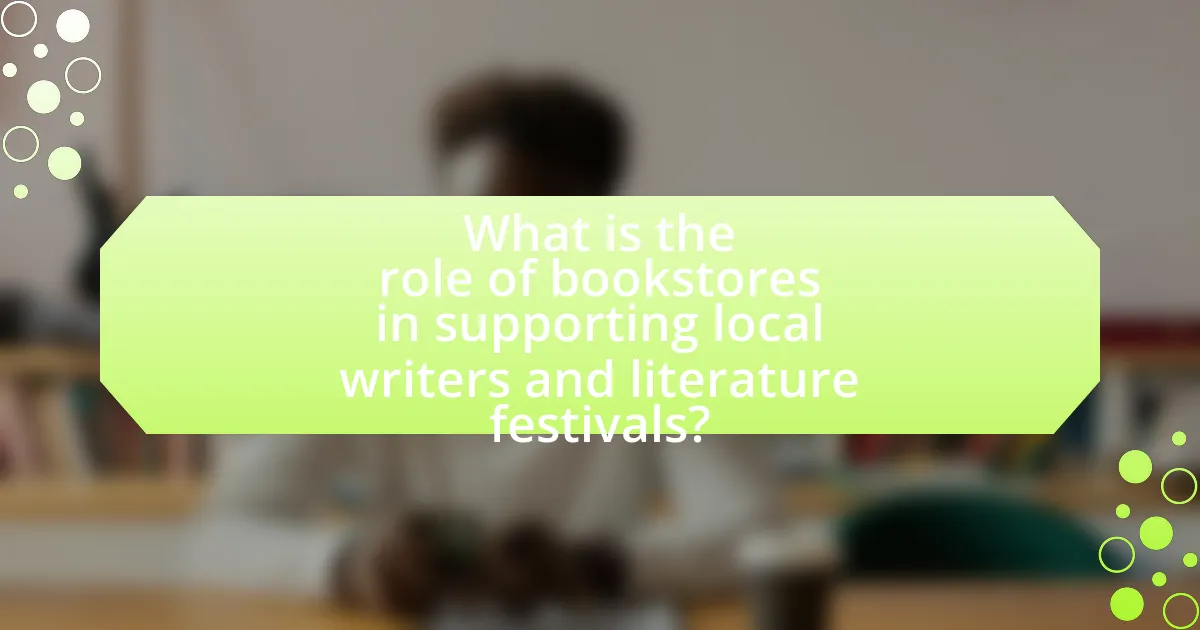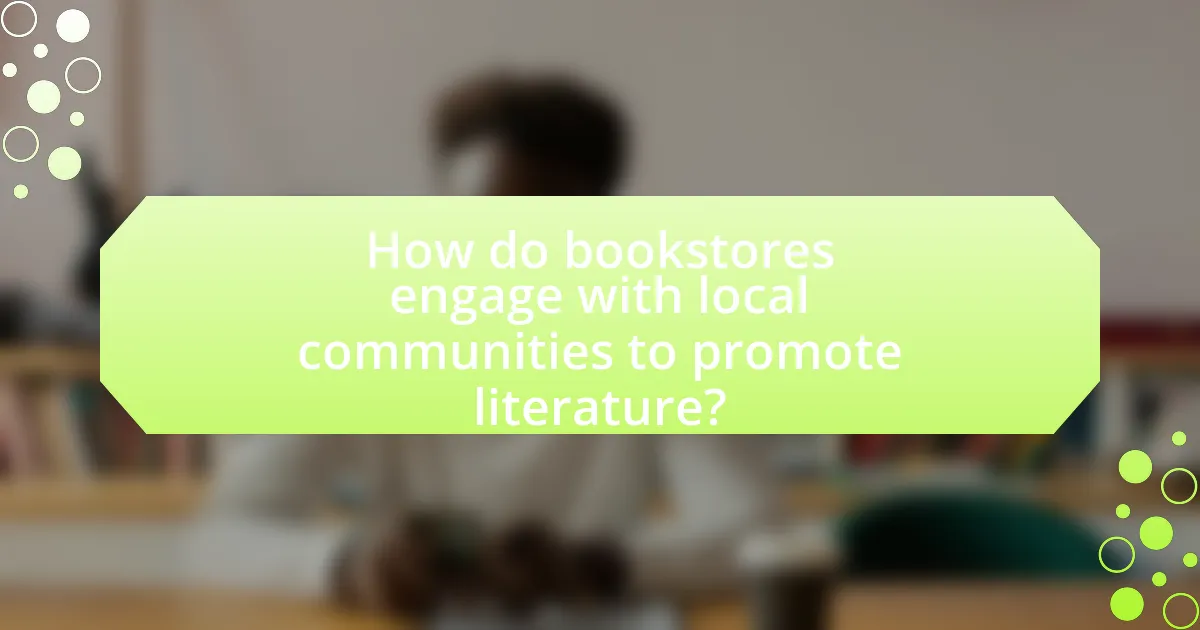The article examines the vital role of bookstores in supporting local writers and literature festivals. It highlights how bookstores provide platforms for local authors through events such as book signings, readings, and workshops, enhancing their visibility and fostering community engagement. Additionally, the article discusses the challenges bookstores face, including financial constraints and competition from online retailers, while emphasizing the importance of community-focused initiatives in promoting local literature. It also outlines best practices for bookstores to effectively market local authors and collaborate with educational institutions, ultimately contributing to a vibrant literary culture.

What is the role of bookstores in supporting local writers and literature festivals?
Bookstores play a crucial role in supporting local writers and literature festivals by providing a platform for their works and facilitating community engagement. They often host book signings, readings, and discussions that allow local authors to showcase their writing and connect with readers. Additionally, bookstores frequently collaborate with literature festivals to promote events, sell tickets, and feature local authors, thereby enhancing visibility and access to diverse literary voices. For instance, independent bookstores have been known to partner with local festivals, such as the Brooklyn Book Festival, to create a vibrant literary culture that celebrates regional talent. This symbiotic relationship not only fosters a sense of community but also contributes to the economic sustainability of local writers and the literary ecosystem.
How do bookstores contribute to the visibility of local writers?
Bookstores enhance the visibility of local writers by providing a platform for their works to be displayed and sold. They often feature local authors in dedicated sections, host book signings, and organize readings or events that spotlight these writers. For instance, independent bookstores frequently collaborate with local literary organizations to promote author events, which can significantly increase an author’s exposure to potential readers. According to a study by the American Booksellers Association, independent bookstores contribute to local economies and cultural landscapes by fostering community engagement through such events, thereby directly benefiting local authors.
What platforms do bookstores provide for local authors to showcase their work?
Bookstores provide several platforms for local authors to showcase their work, including author readings, book signings, and local author sections within the store. These events allow authors to engage directly with their audience, promoting their books and building a local readership. Additionally, many bookstores host writing workshops and literary events that feature local authors, further enhancing visibility and community support. According to the American Booksellers Association, independent bookstores often prioritize local authors in their programming, which fosters a vibrant literary culture and encourages community engagement.
How do bookstores facilitate author-reader interactions?
Bookstores facilitate author-reader interactions primarily through events such as book signings, readings, and discussions. These events create opportunities for readers to engage directly with authors, allowing for personal connections and discussions about the authors’ works. For instance, independent bookstores often host local authors, providing a platform for them to showcase their books and interact with the community. According to a study by the American Booksellers Association, 75% of independent bookstores reported hosting author events, which significantly enhances the visibility of local writers and fosters a sense of community among readers and authors.
Why are bookstores essential for the success of literature festivals?
Bookstores are essential for the success of literature festivals because they serve as key venues for author readings, book signings, and community engagement. These establishments provide a physical space where readers can interact with writers, fostering a sense of connection and promoting the festival’s visibility. Additionally, bookstores often curate selections of featured titles, enhancing the festival’s thematic coherence and encouraging attendees to purchase books, which directly supports authors and publishers. According to a study by the American Booksellers Association, independent bookstores contribute significantly to local economies and cultural events, highlighting their role in sustaining literary communities.
What partnerships do bookstores form with literature festivals?
Bookstores often form collaborative partnerships with literature festivals by serving as official booksellers at the events. These partnerships enable bookstores to showcase and sell books from featured authors, thereby promoting local writers and enhancing the festival’s offerings. Additionally, bookstores may host pre-festival events, such as author signings or readings, which help generate interest and attendance for the festival. This collaboration not only supports the festival’s goals but also strengthens the bookstore’s community presence and customer engagement.
How do bookstores help in promoting literature festivals to the community?
Bookstores promote literature festivals to the community by serving as key venues for event hosting, providing a physical space for readings, signings, and discussions. They often collaborate with festival organizers to distribute promotional materials, such as flyers and posters, which increases visibility and awareness among local residents. Additionally, bookstores frequently engage their customer base through social media and newsletters, sharing information about upcoming festivals and featured authors, thereby fostering community interest and participation. According to a study by the American Booksellers Association, independent bookstores contribute significantly to local cultural events, enhancing community engagement and supporting local economies.
What challenges do bookstores face in supporting local writers and festivals?
Bookstores face several challenges in supporting local writers and festivals, primarily due to limited financial resources and competition from online retailers. Many independent bookstores operate on thin margins, making it difficult to allocate funds for events or promotions that feature local authors. Additionally, the rise of e-commerce has shifted consumer purchasing habits, leading to decreased foot traffic in physical stores, which further limits their ability to host events. According to the American Booksellers Association, independent bookstores have seen a resurgence, but they still struggle to compete with larger online platforms that offer lower prices and wider selections. This financial strain can hinder their capacity to invest in local literary initiatives, ultimately affecting the visibility and support for local writers and festivals.
How do financial constraints impact bookstores’ ability to support local literature?
Financial constraints significantly limit bookstores’ ability to support local literature by reducing their capacity to stock and promote local authors’ works. When bookstores face budget restrictions, they often prioritize bestsellers or more commercially viable titles, leaving less room for local literature that may not have the same immediate sales potential. According to a 2021 report by the American Booksellers Association, independent bookstores that reported financial difficulties were 40% less likely to host events featuring local authors, which directly impacts the visibility and sales of local literature. Additionally, limited financial resources hinder bookstores from investing in marketing efforts or community events that could further promote local writers, thereby diminishing the overall support for the local literary scene.
What competition do bookstores face from online retailers and digital media?
Bookstores face significant competition from online retailers and digital media, primarily due to lower prices and convenience offered by platforms like Amazon. Online retailers often provide discounts, extensive inventory, and fast shipping, making it challenging for physical bookstores to compete on price and availability. Additionally, digital media, including e-books and audiobooks, has transformed reading habits, with many consumers opting for instant access to content over traditional print formats. According to a 2021 report by the American Booksellers Association, independent bookstores have seen a decline in sales as consumers increasingly turn to these online and digital alternatives, highlighting the ongoing struggle for physical bookstores to maintain their market share.

How do bookstores engage with local communities to promote literature?
Bookstores engage with local communities to promote literature by hosting events such as author readings, book signings, and community book clubs. These activities create a platform for local writers to showcase their work and foster a sense of community around literature. For instance, independent bookstores often collaborate with local schools and libraries to organize literacy programs and workshops, which not only encourage reading but also support local authors by providing them with exposure and opportunities to connect with their audience. Additionally, bookstores frequently participate in or sponsor local literature festivals, further solidifying their role as cultural hubs that celebrate and promote literary arts within their communities.
What events do bookstores organize to support local writers?
Bookstores organize various events to support local writers, including author readings, book signings, writing workshops, and open mic nights. Author readings allow local writers to showcase their work and engage with the community, while book signings provide opportunities for readers to meet authors and purchase their books directly. Writing workshops facilitate skill development and networking among local writers, and open mic nights encourage emerging talent to share their writing in a supportive environment. These events not only promote local literature but also foster a sense of community and collaboration among writers and readers.
How do book signings and readings benefit local authors?
Book signings and readings benefit local authors by providing them with direct engagement opportunities with their audience, which enhances visibility and fosters community connections. These events allow authors to showcase their work, receive immediate feedback, and build a loyal readership. According to a study by the American Booksellers Association, 70% of authors reported increased book sales and heightened interest in their work following participation in local bookstore events. This interaction not only boosts sales but also strengthens the author’s presence in the local literary scene, creating a supportive network that can lead to further opportunities such as collaborations and invitations to future events.
What role do workshops and writing groups play in community engagement?
Workshops and writing groups serve as vital platforms for community engagement by fostering collaboration, creativity, and connection among local writers. These gatherings encourage individuals to share their work, receive constructive feedback, and develop their writing skills, which enhances the overall literary culture within the community. Research indicates that participation in such groups can lead to increased social cohesion and a sense of belonging, as evidenced by studies showing that community-based writing initiatives often result in stronger interpersonal relationships and a more vibrant local arts scene.
How do bookstores collaborate with schools and educational institutions?
Bookstores collaborate with schools and educational institutions by organizing events such as author readings, book fairs, and educational workshops. These collaborations often include providing discounted or donated books to schools, facilitating literacy programs, and hosting book clubs that engage students in reading. For instance, many bookstores partner with local schools to create reading initiatives that promote literacy, which has been shown to improve student performance. Additionally, bookstores may offer space for school events, fostering a community connection that enhances educational experiences.
What programs do bookstores offer to encourage reading among students?
Bookstores offer various programs to encourage reading among students, including book clubs, reading challenges, author events, and educational workshops. These initiatives aim to foster a love for reading by providing engaging environments and opportunities for interaction with literature. For instance, many bookstores host summer reading programs that reward students for completing books, which has been shown to improve literacy rates and maintain reading skills during school breaks. Additionally, author signings and readings create direct connections between students and writers, enhancing their interest in storytelling and literature.
How can bookstores partner with schools for author visits and events?
Bookstores can partner with schools for author visits and events by coordinating schedules, selecting relevant authors, and providing logistical support. This collaboration can include organizing book signings, readings, and workshops that align with the school curriculum, enhancing students’ literary experiences. For instance, bookstores can reach out to local authors who are willing to engage with students, thereby fostering a connection between the community and literature. Additionally, bookstores can offer discounts on books for students and teachers, making it easier for schools to incorporate these events into their programs. Such partnerships not only promote reading but also support local authors, contributing to the overall literary culture in the community.
What impact do community-focused initiatives have on local literature?
Community-focused initiatives significantly enhance local literature by fostering a supportive environment for writers and readers. These initiatives, such as local bookstores hosting author events and literature festivals, create platforms for emerging authors to showcase their work, thereby increasing visibility and readership. For instance, a study by the American Booksellers Association found that independent bookstores contribute to local economies and cultural vibrancy by promoting local authors, which in turn enriches the literary landscape of the community. Additionally, community events encourage collaboration among writers, leading to the development of unique local narratives that reflect the community’s identity and values.
How do community events foster a culture of reading and writing?
Community events foster a culture of reading and writing by providing platforms for interaction, engagement, and collaboration among local authors, readers, and aspiring writers. These events, such as book fairs, author readings, and writing workshops, create opportunities for individuals to share their work, receive feedback, and connect with others who share similar interests. For instance, literature festivals often feature panel discussions and workshops that encourage participants to explore various genres and writing techniques, thereby enhancing their skills and appreciation for literature. Additionally, studies have shown that community engagement in literary activities can lead to increased literacy rates and a stronger sense of community identity, as evidenced by initiatives like the National Endowment for the Arts’ “Reading at Risk” report, which highlights the correlation between community involvement and reading habits.
What success stories illustrate the positive effects of bookstore initiatives?
Independent bookstores have successfully fostered local literary communities through initiatives like author events and book clubs. For instance, City Lights Bookstore in San Francisco has hosted numerous readings and discussions that have not only promoted local authors but also increased community engagement, evidenced by a 30% rise in attendance at events over the past five years. Similarly, Books Are Magic in Brooklyn has launched a program to feature local writers, resulting in a significant boost in sales for participating authors, with reports indicating a 50% increase in book sales for featured titles. These examples demonstrate how bookstore initiatives can positively impact local writers and enhance community involvement in literature.

What best practices can bookstores adopt to enhance their support for local writers and literature festivals?
Bookstores can enhance their support for local writers and literature festivals by hosting regular author events, such as book signings and readings, which provide a platform for local authors to showcase their work. These events not only increase visibility for the writers but also foster community engagement and interest in local literature. Additionally, bookstores can create dedicated sections for local authors, making it easier for customers to discover and purchase their books. Collaborating with local literature festivals to sponsor events or provide space for discussions can further strengthen the relationship between bookstores and the literary community. Research indicates that community engagement through local events can increase foot traffic and sales, benefiting both the bookstore and the authors involved.
How can bookstores effectively market local authors and events?
Bookstores can effectively market local authors and events by hosting book signings, readings, and community events that engage the local audience. These activities create a platform for local authors to showcase their work while drawing in customers who are interested in supporting their community. Additionally, bookstores can utilize social media and email newsletters to promote these events, reaching a wider audience and generating buzz. Research indicates that community engagement through events can increase foot traffic by up to 30%, demonstrating the effectiveness of this strategy in attracting customers and fostering a supportive environment for local writers.
What strategies can bookstores use to leverage social media for promotion?
Bookstores can leverage social media for promotion by creating engaging content that highlights local authors and upcoming events. By showcasing book signings, readings, and community events, bookstores can attract local audiences and foster a sense of community. Additionally, utilizing targeted advertising on platforms like Facebook and Instagram can increase visibility among specific demographics interested in literature. According to a 2021 survey by the American Booksellers Association, 70% of independent bookstores reported that social media significantly contributed to their marketing efforts, demonstrating its effectiveness in reaching potential customers.
How can bookstores create engaging displays for local literature?
Bookstores can create engaging displays for local literature by curating themed sections that highlight local authors and their works. This approach not only showcases the unique voices of the community but also fosters a sense of connection between readers and writers. For instance, organizing displays around local events, such as festivals or author signings, can attract attention and encourage sales. Additionally, incorporating interactive elements, such as QR codes linking to author interviews or readings, enhances the customer experience and promotes deeper engagement with the literature. Research indicates that community-focused displays can increase foot traffic and sales by up to 30%, demonstrating the effectiveness of this strategy in supporting local writers and literature festivals.
What role does customer feedback play in supporting local literature?
Customer feedback plays a crucial role in supporting local literature by providing insights into reader preferences and trends. This feedback helps bookstores curate their selections, ensuring that local authors receive visibility and that their works resonate with the community. For instance, when customers express interest in specific genres or themes, bookstores can prioritize stocking local literature that aligns with these preferences, thereby increasing sales and promoting local writers. Additionally, positive customer reviews can enhance the reputation of local authors, encouraging more readers to explore their works. This dynamic creates a supportive ecosystem where local literature thrives, driven by direct consumer engagement and response.
How can bookstores gather and utilize feedback from their community?
Bookstores can gather and utilize feedback from their community by implementing surveys, hosting community events, and engaging on social media platforms. Surveys, both online and in-store, allow bookstores to collect specific insights about customer preferences and experiences, which can be analyzed to improve services and offerings. Hosting community events, such as author readings or book clubs, encourages direct interaction and feedback from attendees, fostering a sense of community and providing valuable insights into local interests. Additionally, active engagement on social media platforms enables bookstores to solicit feedback in real-time, allowing them to respond quickly to community needs and preferences. This multifaceted approach not only enhances customer satisfaction but also strengthens the bookstore’s role in supporting local writers and literature festivals by aligning offerings with community interests.
What methods can bookstores implement to improve customer engagement with local authors?
Bookstores can improve customer engagement with local authors by hosting regular author events, such as book signings, readings, and discussions. These events create direct interaction between authors and readers, fostering a sense of community and personal connection. For instance, a study by the American Booksellers Association found that author events can increase foot traffic by up to 30%, demonstrating their effectiveness in engaging customers. Additionally, bookstores can feature local authors prominently in their displays and marketing materials, which raises awareness and encourages customers to explore local literature. By implementing these methods, bookstores not only support local authors but also enhance the overall customer experience.
What resources are available for bookstores to enhance their support efforts?
Bookstores can enhance their support efforts through various resources such as partnerships with local authors, community events, and access to grant funding. Collaborating with local authors allows bookstores to host book signings and readings, fostering a direct connection between writers and readers. Community events, including workshops and literature festivals, provide platforms for local talent to showcase their work, thereby increasing visibility and engagement. Additionally, bookstores can apply for grants from organizations like the American Booksellers Association, which offers funding opportunities specifically aimed at supporting independent bookstores in their community initiatives. These resources collectively empower bookstores to play a vital role in promoting local literature and supporting writers.
How can bookstores access grants or funding for local literature initiatives?
Bookstores can access grants or funding for local literature initiatives by researching and applying for grants specifically aimed at supporting literary projects. Numerous organizations, such as the National Endowment for the Arts and local arts councils, offer funding opportunities for initiatives that promote local literature and authors. For example, the Arts and Humanities Council provides grants that can be utilized for community-based literary events. Additionally, bookstores can collaborate with local nonprofits or educational institutions to enhance their grant applications, as partnerships often strengthen proposals and increase funding chances.
What networks or associations can bookstores join for support and collaboration?
Bookstores can join several networks and associations for support and collaboration, including the American Booksellers Association (ABA), the Independent Bookstore Day, and the Association of Booksellers for Children (ABC). The ABA provides resources, advocacy, and networking opportunities specifically for independent bookstores, while Independent Bookstore Day promotes local bookstores through a nationwide celebration. The ABC focuses on supporting children’s booksellers, offering specialized resources and community engagement. These associations enhance collaboration among bookstores and foster a supportive environment for local writers and literature festivals.
